Embibe Experts Solutions for Chapter: Capacitance, Exercise 4: Exercise-4
Embibe Experts Physics Solutions for Exercise - Embibe Experts Solutions for Chapter: Capacitance, Exercise 4: Exercise-4
Attempt the practice questions on Chapter 23: Capacitance, Exercise 4: Exercise-4 with hints and solutions to strengthen your understanding. Beta Question Bank for Engineering: Physics solutions are prepared by Experienced Embibe Experts.
Questions from Embibe Experts Solutions for Chapter: Capacitance, Exercise 4: Exercise-4 with Hints & Solutions
Five identical conducting plates and are fixed parallel to and equidistant from each other (see figure). Plates and are connected by a conductor while and are joined by another conductor. The junction of and and the plate are connected to a source of constant e.m.f. . Find
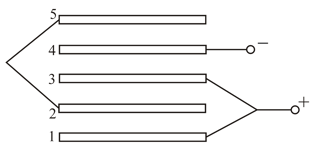
(i) the effective capacity of the system between the terminals of the source
(ii) the charges on plates and .
Given: distance between any successive plates and area of either face of each plate.
When the switch in the figure is thrown to the left, the plates of capacitors acquire a potential difference . Initially the capacitors and are uncharged. The switch is now thrown to the right. What are the final charges and on the corresponding capacitors.
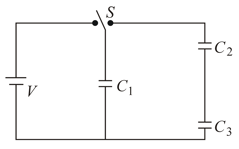
A capacitor consists of two air spaced concentric cylinders. The outer radius is fixed, and the inner is of radius . If breakdown of air occurs at field strength than show that the inner cylinder should have
(i) radius if the potential of the inner cylinder is to be maximum.
(ii) radius if the energy per unit length of the system is to be maximum.
The lower plate of a parallel plate capacitor lies on an insulating plane. The upper plate is suspended from one end of a balance. The two plates are joined together by a thin wire and subsequently disconnected. The balance is achieved. A voltage is applied between the plates, what additional weight should be placed to maintain the balance? The separation between the plates and the area of each plate .
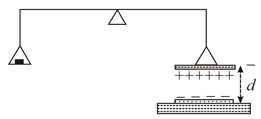
Find the charge which flows from point to , when switch is closed.
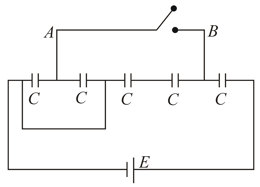
Three capacitors of and are individually charged with batteries of emf's and respectively. After disconnecting from the voltage sources, these capacitors are connected as shown in figure with their positive polarity plates are connected to and negative polarity s earthed. Now a battery of and an uncharged capacitor of capacitance are connected to the junction as shown with a switch . When switch is closed, find (i) the potential of the junction . (ii) final charges on all four capacitors.
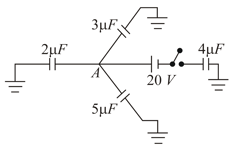
The plates of a parallel plate capacitor are separated by a distance . Two parallel sided dielectric slabs of thickness and fill the space between the plates. If the dielectric constants of the two slabs are and respectively and a potential difference of is applied across the plates Find: (i) the electric field intensities in eahc of the slabs. (ii) the ratio of electric energies stored in the first to that in the second dielectric slab.
Two parallel plate capacitors of capacitance and ae connected in parallel then following steps are performed.
(i) A battery of voltage is connected across the capacitors.
(ii) A dielectric slab of relative permittivity is slowly inserted in capacitor .
(iii) Battery is disconnected.
(iv) Dielectric slab is slowly removed from capacitor.
Find the heat produced in (i) and work done by external agent in step (ii) & (iv).
